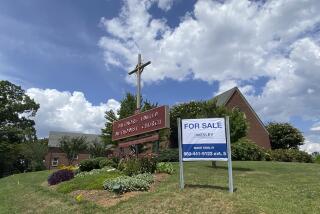Non-TV Denominations Get More for Their Money
- Share via
NEW YORK — Recently spotlighted moral-financial hanky-panky in some TV ministries have raised questions about what all the money given to them accomplishes, compared to results from other religious giving.
Just what specific work is sustained by the donated TV millions in comparison to that resulting from similar contributions to other churches?
One denominational official has come up with figures that offer some striking contrasts, showing that church dollars do far more in a tangible way than the TV-given dollars.
The situation can be likened to that in other major religious denominations generally in view of the similaries of their methods and operations.
Robert F. Polk of Dallas, director of Cooperative Program Promotion for the Baptist General Convention of Texas, brought out the broadly applicable picture in the nation’s biggest Protestant body--the 14.6 million Southern Baptists.
He noted that they gave about $635 million in 1986 to support the denomination’s worldwide missions and humanitarian programs, a sum in the same range as the reported combined giving of $684 million to six leading TV ministers.
From the roughly equal amounts, what tasks were carried out in each of the two arenas?
As for the TV money, Polk cites reports that besides paying for the TV shows, it supported four schools, one hospital, three churches, two ministries to needy children, one to others in need and one home for unwed mothers.
The extent of those services, Polk pointed out, are scant compared to the immense tasks carried on from a similar amount of money given to the cooperative program of a single denomination, Southern Baptists.
Programs Supported
Among other things, the Baptist donations supported 52 children’s homes, 48 hospitals, including 23 overseas, 33 nursing homes or homes for the aged, and 67 colleges and universities enrolling 200,000 students.
The denominational money also supported 3,756 foreign missionaries in more than 100 nations, 3,637 home missionaries in the United States, and ministries to students on 1,100 campuses.
Also, the Southern Baptist funds supported six seminaries, enrolling a fifth of the seminarians in the country, and also a TV network, the American Christian Television System (ACTS), carried on cable in many cities.
Polk called the operations from the denominational funds “the greatest outreach ministry in the world,” sustained by an amount similar to the total of the six TV ministries, yet hugely overshadowing them in results.
Another striking difference, he said, is the accountability in church operations, with state and national conventions deciding how the money is spent and regular audited reports made at state and national levels.
“From the local church to the missionary on the foreign field, every penny given is accounted for,” he said.
Similar decision-making on programs and spending is made by representatives of other Protestant denominations, which also provide audited financial reports, as do Roman Catholic dioceses.
Polk noted that none of the top money-getting TV ministers belong to the Evangelical Council for Financial Accountability in Washington whose member agencies must meet various standards, including audited financial reports.
Among its members, however, are evangelist Billy Graham, who only periodically televises parts of crusades in different cities, and Chuck Colson’s Prison Fellowship, which carries on an extensive prison ministry.
Polk, in comparing Southern Baptist work done with a sum similar to the total of six TV ministers, cited 1986 gross incomes reported in U.S. News and World Report of the following religious broadcasters:
Pat Robertson, $176 million; Jim Bakker, $172 million; Jimmy Swaggart, $142 million; Jerry Falwell, $100 million; Robert Schuller, $36 million; Oral Roberts, $58 million.
More to Read
Sign up for Essential California
The most important California stories and recommendations in your inbox every morning.
You may occasionally receive promotional content from the Los Angeles Times.










